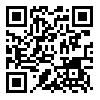
Journal of Emergency Health Care
Formerly known as: International Journal of Medical Investigation

Volume 13, Issue 4 (12-2024)
J Emerg Health Care 2024, 13(4): 69-75 |
Back to browse issues page
Download citation:
BibTeX | RIS | EndNote | Medlars | ProCite | Reference Manager | RefWorks
Send citation to:



BibTeX | RIS | EndNote | Medlars | ProCite | Reference Manager | RefWorks
Send citation to:
Zaman Abadi F A N, Motamed S A, Hosseinzadeh Z. Comparing the Effectiveness of Reality Therapy and Cognitive Rehabilitation on Strengthening Attention and Self-Control of Children with Autism. J Emerg Health Care 2024; 13 (4) :69-75
URL: http://intjmi.com/article-1-1206-en.html
URL: http://intjmi.com/article-1-1206-en.html
Master of Educational Psychology, Payam Noor University, Mobarakeh Branch, Isfahan, Iran.
Abstract: (1151 Views)
Background:
This research was conducted with the aim of comparing the effectiveness of reality therapy and cognitive rehabilitation on strengthening attention and self-control of children with autism.
Method:
The current research is semi-experimental (pre-test, post-test and follow-up test design with a control group) and the statistical population of the research is made up of all children with autism who refer to medical centers in Tehran. A number of 42 children were selected by available sampling method and randomly placed in the attention enhancement group (14 people), self-control group (14 people) and control group (14 people). The tools used in the research are the Cambridge Neuropsychological Test and the Connors Child and Adolescent Neuropsychological Scale (2004). Independent variables were performed for two experimental groups. The first and second experimental groups received cognitive rehabilitation and reality therapy. The third group was placed on the waiting list as a control group and did not receive any treatment during the study. The data was analyzed based on variance analysis with repeated measurements.
Results:
The findings show that the average of the variables is still high even in the follow-up phase in addition to the post-test.
Conclusion:
The effectiveness of both approaches has had an effect size of 44% on increasing self-control of children with autism and 21% on strengthening attention.
This research was conducted with the aim of comparing the effectiveness of reality therapy and cognitive rehabilitation on strengthening attention and self-control of children with autism.
Method:
The current research is semi-experimental (pre-test, post-test and follow-up test design with a control group) and the statistical population of the research is made up of all children with autism who refer to medical centers in Tehran. A number of 42 children were selected by available sampling method and randomly placed in the attention enhancement group (14 people), self-control group (14 people) and control group (14 people). The tools used in the research are the Cambridge Neuropsychological Test and the Connors Child and Adolescent Neuropsychological Scale (2004). Independent variables were performed for two experimental groups. The first and second experimental groups received cognitive rehabilitation and reality therapy. The third group was placed on the waiting list as a control group and did not receive any treatment during the study. The data was analyzed based on variance analysis with repeated measurements.
Results:
The findings show that the average of the variables is still high even in the follow-up phase in addition to the post-test.
Conclusion:
The effectiveness of both approaches has had an effect size of 44% on increasing self-control of children with autism and 21% on strengthening attention.
| Rights and permissions | |
 |
This work is licensed under a Creative Commons Attribution-NonCommercial 4.0 International License. |



